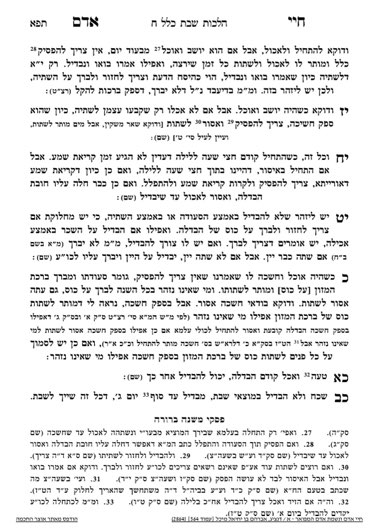We are beginning siman 21. The Chayei Adam writes that if one makes a mistake and eats before reciting havdalah on a kos, they can (and should) still recite havdalah. The Mishnah Berurah adds that even if a person intentionally eats before havdalah, it does not preclude a person from reciting havdalah. The reason this halacha is pointed out is because there is an opinion in the Gemara that once a person eats, they can no longer make havdalah themselves. They are not exempt from havdalah in totality, in order not to allow one who sins to benefit, but he must now find someone else to be motzi him in havdalah.
There is a machlokes rishonim in understanding this opinion. The rishonim in Pesachim understand it is a knas, a fine, for what he has done wrong. Rabbeinu Yonah understands that it is not a knas, but rather that the person should wait until the next morning, until the next time they are planning to eat, before making havdalah. He explains that part of havdalah is an issur to eat, so havdalah should be recited in the context of allowing consumption of food. Since the person ate on Motzei Shabbos, they can no longer demonstrate how havdalah allows food consumption on Motzei Shabbos. Therefore, they must wait for a new opportunity–Sunday morning–and try again.
Therefore, the Chayei Adam concludes that we do not pasken in accordance with this opinion, but rather in accordance with the opinion that havdalah is freestanding.
In response to the opinion that it is a knas, other rishonim write that if the person who ate is not allowed to make their own havdalah, they would not be able to be yotzei through shomeah k’oneh either, because shomeah k’oneh only works if both parties are able to be motzi themselves. The opinion that it is a knas would rebut that although Chazal imposed a knas that the person cannot make havdalah himself, Chazal did not take away the person’s ability to be yotzei through shomeah k’oneh in this case, because they did not want the person to end up without any havdalah whatsoever.
Either way, we pasken that a person who ate is still able to recite havdalah. However, we can appreciate how seriously Chazal took the issur of eating before havdalah if such an opinion was entertained. We do not see this concept of a knas for any other mitzvah other than havdalah.
In siman 22, the Chayei Adam writes that if a person did not recite havdalah on Motzei Shabbos, they can recite havdalah until shkia on Tuesday afternoon. The Chayei Adam explains that the first half of the week is understood to be the aftereffects of Shabbos, so havdalah is still appropriate. The Mishnah Berurah writes that, preferably, one should recite havdalah as soon as possible.
If a person is making havdalah after Motzei Shabbos, they only make the brachos of hagafen and hamavdil. They do not make the brachos on besamim and the ner.
Summary
- If one purposely or accidentally ate before havdalah on a kos, they can still make havdalah.
- One should make havdalah as soon as possible.
- One can make havdalah until the end of Tuesday. If one makes havdalah after Motzei SHabbos, they only recite hagafen and hamavdil.



